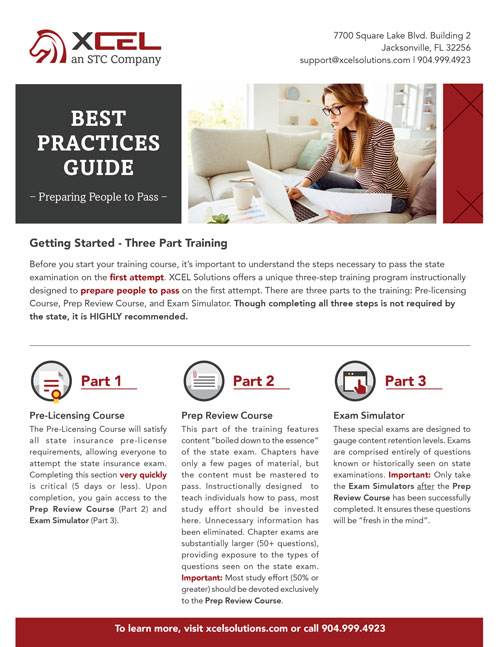When you start down the path to becoming a licensed insurance agent, you’re on your way to a flexible and fulfilling career. You’ll have a pivotal role in safeguarding the financial future of individuals and businesses. Insurance policies offers individuals and businesses a shield of financial protection against unpredictable events and unexpected losses. It acts as a robust safety net, delivering coverage against a spectrum of potential risks such as property damage, healthcare expenses, or business disruptions.
As an insurance agent, you are the lynchpin connecting insurance providers with clients, serving as a trusted consultant who informs and educates them about suitable insurance types and policies tailored to their distinct needs. It’s a profession that offers not only flexibility but also immense satisfaction.
The journey to becoming an insurance agent can be swift and straightforward. Whether you’re a fresh graduate on the hunt for a purposeful career, an experienced professional considering a new direction, or someone fueled by the desire to assist others in securing their future, this comprehensive guide is your roadmap to the insurance license process. It details the insurance agent requirements, skills, and wisdom needed to transform yourself from an aspiring insurance agent into a proficient and reliable insurance expert. Remember, your success is in your hands!
Growing Opportunities in the Insurance Industry
The insurance landscape is in a state of flux. Propelled by innovative insurance technology (insurtech) companies, the industry is witnessing an influx of novel insurance products and streamlined processes for underwriting, claims handling, and risk evaluation. Today’s customers prefer personalized insurance solutions, fostering a growing demand for flexibility and autonomy over their coverage plans. This desire has catalyzed the emergence of on-demand insurance models that can be fine-tuned to align with ever-evolving needs and preferences.
As we witness an increase in aging populations worldwide, the necessity for long-term care insurance is escalating. Insurance companies are responding by crafting new products to tackle the financial hurdles tied to healthcare and assisted living for older adults. Moreover, the amplified risks triggered by climate change have heightened the need for insurance products that safeguard against environmental liabilities, property damage, and business disruptions due to natural disasters.
All of this change translates into expanding job growth for licensed insurance agents. In fact, the U.S. Bureau of Labor Statistics projects employment of insurance sales agents to grow 8% between 2022 to 2032 — that’s faster than the average for all occupations. As the insurance industry evolves to meet these changes, there are nearly limitless career opportunities for those ready to ride the wave of evolution.
Licensing Process and Education Requirements
Though the only formal education requirement to become a licensed insurance agent is a high school diploma or equivalent, having a college education can enhance your credibility and provide a foundation for understanding business concepts and communication skills. Many insurance companies prefer degrees in business, finance, or economics.
The insurance licensing process can vary by state. In general, the steps include:
- Insurance pre-licensing education – Pre-licensing education courses cover the basics of insurance, including types of insurance, regulations, ethics, and sales practices. The number of required hours and specific topics can vary by state. In most cases, these courses are a qualification for taking an insurance license exam.
- Insurance licensing exams – After completing pre-licensing education, you must pass a licensing exam specific to the type of insurance you want to sell, such as life and health insurance or property and casualty insurance. The exams are state-specific, and typically test knowledge of insurance laws, regulations, and product details. Some insurance training providers bundle all of these courses to make it easier and faster to become licensed.
- Specialized training and certifications – You may choose to earn additional certifications to specialize in specific areas of insurance such as risk management, underwriting, or financial planning. These certifications can enhance your expertise and marketability and help you move your insurance agent career forward.
- Professional Development – Many insurance companies provide training to help insurance agents develop relevant skills to accelerate early success. These skills fall into the areas of communication, sales and marketing, essentially the skills to engage with clients. Another top skill area is understanding risk assessment.
Learn how you can get your insurance license in four steps.
Choosing Your Niche
The world of insurance is packed with a multitude of insurance types and an array of products within each category. As you embark on your journey to becoming an insurance agent, it’s essential to home in on a specific insurance type that resonates with you. This decision is pivotal, as your licensing requirements for insurance will be directly linked to the line of insurance business and products you wish to offer.
Think about your passions and aptitudes when selecting your niche. For example, if helping families secure their financial future and strategize long-term planning intrigues you, life insurance could be your calling. On the other hand, if you have a knack for safeguarding businesses and individuals from financial setbacks due to property damage or liability, and a desire to delve into local regulations and diverse business types, pursuing licensure in property insurance may be right up your alley. Remember, as you accumulate experience, you can always expand your horizons by getting licensed in other insurance lines.
Gaining Experience for Your Insurance Agent Career
As you start your journey, look for internships or entry-level positions with insurance agencies or companies. These provide hands-on experience, exposure to the industry, and the chance to work alongside experienced professionals. You can also participate in a mentorship program. Mentorship by an experienced insurance agent can provide valuable insights, guidance, and advice as you navigate the challenges and opportunities in the industry.
Establishing a Client Base
Success as a licensed insurance agent depends on building your network of clients and prospects. There are a number of strategies you can use to get your name out in your community and start establishing a base of clients:
- Build a professional network – join industry and community associations and attend networking events both in person and through online platforms to raise your profile with possible sources of client referrals.
- Leverage technology – become proficient with your employer’s customer relationship management (CRM) system. A CRM can help you keep prospect and client data organized, improve communication, and automate administrative tasks so you have more time for building client relationships. Learn about best practices for online marketing and creating and maintaining a professional social media presence to help prospects connect with you.
- Stay informed about industry trends – remember, you are your clients’ trusted advisor. They’re counting on you to stay current with the industry. Keep up with trends that might impact the products and services you offer clients by pursuing continuous learning and professional development. You can also subscribe to industry publications.
Dealing with Challenges
Rejection and setbacks are to be expected in your career as an insurance agent. Successful insurance agents develop resilience and employ strategies to cope with rejection such as asking for feedback, staying positive and celebrating small wins, and diversifying their approach to client development.
Change is also an inevitable challenge in every profession, including insurance. You can adapt to changes in the industry and position yourself for long-term success by staying proactive, embracing change, and adopting a forward-thinking approach.
Maintaining Ethical Standards
Your clients will rely on your professionalism as a licensed insurance agent to guide them through complex policies, claims, and risk assessments that will likely impact their future. Maintaining ethical standards is the foundation for building trust with clients that can lead to long-term relationships. It also protects your reputation and credibility in the insurance industry.
Advancement Opportunities
As you gain experience, taking on a leadership role in your insurance company can help you advance your insurance agent career. If you’d eventually like to be in business for yourself, start exploring entrepreneurial ventures – it’s never too early to start laying the groundwork for opening your own agency. You can also download the XCEL Insurance Playbook to see how other licensed insurance agents have built success.
As a licensed insurance agent, your success is directly tied to the positive impact you make on the lives of others. A career in insurance can be flexible and personally rewarding. To take your first steps on your journey, explore life and health insurance pre-licensing courses or property and casualty insurance pre-licensing courses today.
FAQs
What qualifications do I need to become a licensed insurance agent?
Most states require that you have a high school diploma or equivalent, and that you pass an insurance license exam. Check with your state for specific requirements that can vary with the types of insurance products you wish to sell.
How long does it take to obtain an insurance license?
The insurance license process can take anywhere from a few weeks to a few months, depending on your location and how quickly you complete each step.
Can I become an insurance agent without a college degree?
Yes. However, many insurance companies prefer new recruits to have a college degree in a field such as business, finance or economics.
What are the typical challenges faced by insurance agents?
A primary challenge is staying positive despite rejection by prospects not interested in purchasing insurance. Because the insurance industry is evolving quickly, adapting to changing technologies, regulations, and ways of doing business can also be a challenge. Licensed insurance agents who stay informed, build strong relationships, and embrace technological advancements are better positioned to overcome these challenges and thrive in the insurance industry.
How can I stay updated on changes in the insurance industry?
Being proactive is important. So is seeking out information from a variety of resources, including company training and continuing education, industry associations, regulatory webinars and online courses, and peer-to-peer discussions.




